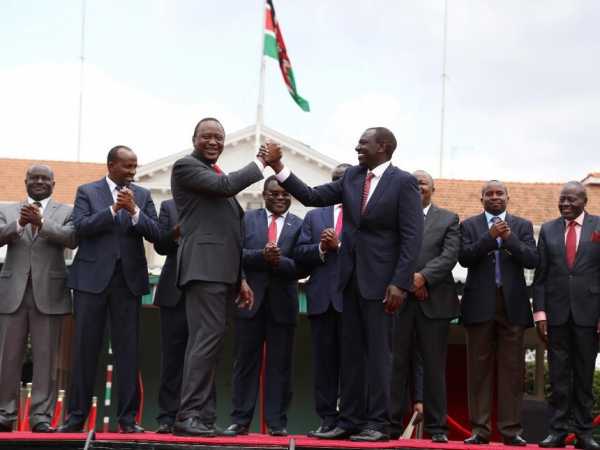Opposition chief Raila Odinga yesterday rejected assertions by President Uhuru Kenyatta that the new overarching Jubilee Party will usher in an era of Kenyan unity.
Raila commented after the head of state proclaimed from his State House Nairobi pulpit his new political vehicle would be launched on September 9 and 10. He called it his legacy.
Raila and Amani National Congress leader Musalia Mudavadi accused Uhuru and Deputy President William Ruto of trying to create a monolithic party state. They said they are prepared to confront the ruling coalition of nine to 12 merged parties.
“It’s not right to have one monolithic party…But we assure our supporters we are ready and unshaken,” Raila told the press at Orange House Nairobi after meeting Gusii leaders.
While announcing the JP launch, Uhuru sought to reassure supporters nominations next year will be free, fair and transparent.
The party — Uhuru calls it the “new baby in town” — will be unveiled a day after all constituent parties dissolve.
On a red dais on State House lawn, Uhuru reached out to Jubilee rebels, urging them to seek reelection on a JP ticket. He asked them to capitalise on nominations to gauge their popularity.
JP will use the IEBC to ensure nominations are free and fair, the President said.
Uhuru made a point of dismissing anyone saying he or she has been endorsed by him or Ruto for any position.
“The President and DP have one vote each and instead of protesting or shying away, we ask you to go back to wananchi who have millions of votes and can dictate the popular politician during the nominations,” Uhuru said.
JP will hold nominations in mid-May 2017 to block losers from jumping to other parties, according to its nomination rules.
It has drawn up tough nomination rules that exclude any candidate who commits, encourages or condones violence of any kind by any person on primary day.
Bitter competition already has broken out between elected leaders and aspirants in eight hot-spot counties.
These cleavages are already threatening party unity.
“What we are doing, we are rewriting history where individual parties died in Kenya by bringing together 12 parties to merge into one strong entity that brings together Kenyans,” Uhuru said.
Speaking at State House, TNA chairman Johnson Sakaja said the proclamation of the Jubilee Party at State House signalled a new beginning in Kenya’s politics.
“We challenge our competitors to embrace the IEBC during nominations so we can have one big nomination day across all parties,” he said.
JP will hold primaries no more than 30 days before the formal nominations date set by the electoral commission.
Nomination rules were presented to Uhuru two weeks ago and
were drawn up by the national steering committee co-chaired by Kiraitu Murungi and Noah Wekesa.
The Independent Electoral and Boundaries Commission has set June 6-13 as the dates for receiving nomination papers.
The electoral agency says those who want to run as independents must resign from their parties by June 10.
Holding primaries close to the IEBC nomination date will ensure losers don’t have time to damage Jubilee Party’s chances by jumping to other parties or running as independents.
Eight important counties have been identified as flash points where serious fallout is possible from contested nominations. They are Nairobi, Nakuru, Kiambu, Nyeri, Bomet, Kericho, Nandi and Elgeyo Marakwet.
According to nomination rules, any candidate dissatisfied with primary results may appeal to the National Elections Appeal Tribunal within 24 hours of announcement of results.
“The winner of the nomination will be issued with a prescribed certificate by the National Elections Board not more than 48 hours after the announcement of the results or after an appeal contesting the nomination results has been resolved,” the rules say.
The rules state the Jubilee Party National Elections Board will ensure all required electoral materials reach polling centers 12 hours before nominations begin.
If materials are late, the NEB will inform the National Executive Committee, which will advise on action.
Before nomination day, each candidate must sign the party loyalty pledge, seconded by registered JP members.
Primaries will run from 6am-5pm, when all polling centres close.
In case of violence or a security threat, a presiding officer can close a polling station.
“The presiding officer may extend nomination by no more than one hour for reasons recorded in writing and announced to the assembly of voters,” the rules state.
Location of polling centres will be determined by County Elections Boards responsible for conducting nominations.
The NEB will be responsible for nomination of the presidential candidate and deputy. It will receive reports of other nominations.
On nomination day, NEB-cleared candidates will present themselves before presiding officers with their Party Compliance Certificates.
Before voting, the presiding officer must put in place a system ensuring no voter is able to vote more than once. Officers must provide a place where voters can assemble in an orderly manner before polls open.
The presiding officer must ensure ballots papers are in the form of a serialised booklet and bear the official party stamp.
They are to ensure all ballot boxes are transparent, confirmed empty by all agents and sealed before voting starts.
Yesterday, Raila said, “Kenyans are already united in ODM and in Cord. So there are no Kenyan to unite in Jubilee.”
For the first time after many months, Raila revisited the ICC issue, saying there is no longer
the ICC issue to cling to.
Critics have often said Uhuru and Ruto used their emotive indictment at The Hague to lock Raila from the populous Kalenjin vote in 2013.
The Cord leader said the Nairobi governor’s seat will remain in ODM, just days after polls showed his city governor Evans Kidero was still leading.








